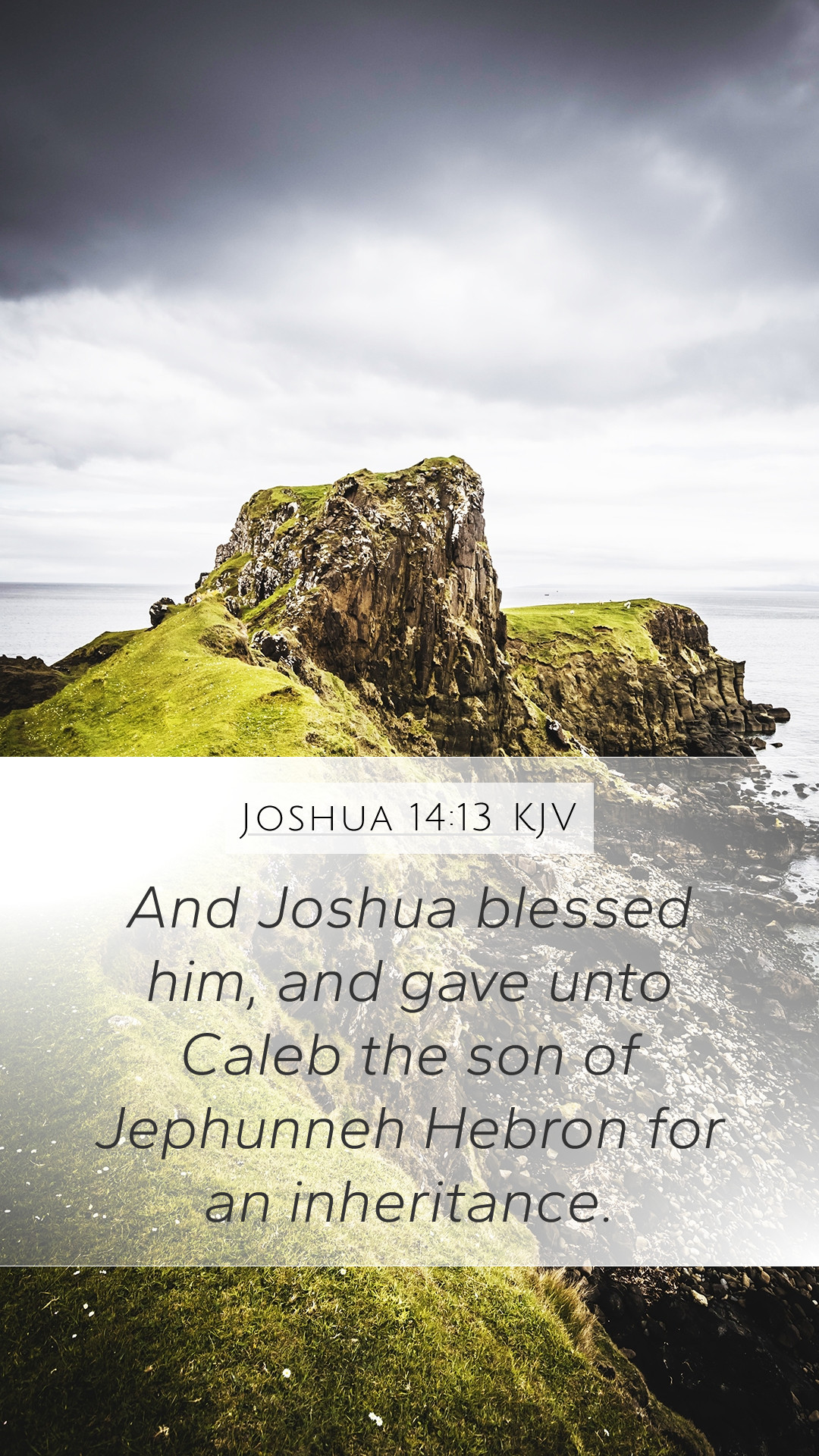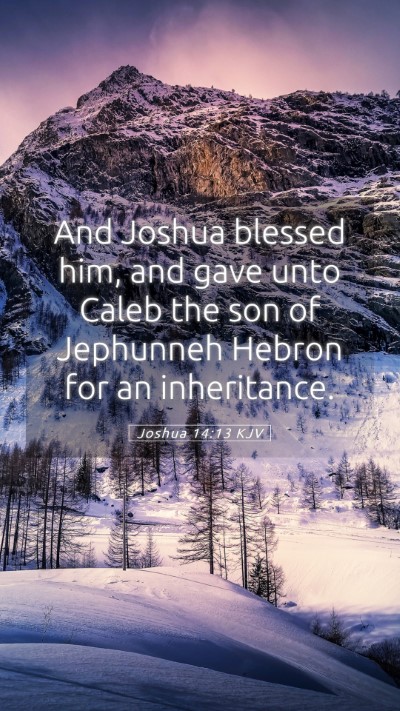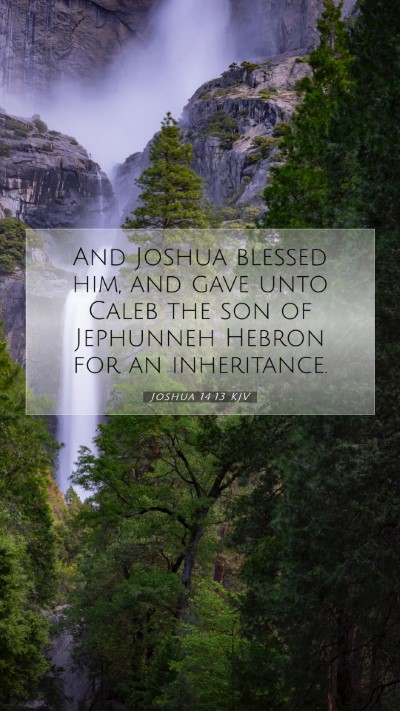Old Testament
Genesis Exodus Leviticus Numbers Deuteronomy Joshua Judges Ruth 1 Samuel 2 Samuel 1 Kings 2 Kings 1 Chronicles 2 Chronicles Ezra Nehemiah Esther Job Psalms Proverbs Ecclesiastes Song of Solomon Isaiah Jeremiah Lamentations Ezekiel Daniel Hosea Joel Amos Obadiah Jonah Micah Nahum Habakkuk Zephaniah Haggai Zechariah MalachiJoshua 14:13 Meaning
What is the meaning of Joshua 14:13?
And Joshua blessed him, and gave unto Caleb the son of Jephunneh Hebron for an inheritance.
Joshua 14:13 Bible Verse Meaning
Bible Verse Commentary on Joshua 14:13
Introduction
Joshua 14:13 states: “And Joshua blessed him, and gave unto Caleb the son of Jephunneh Hebron for an inheritance.” This verse encapsulates a critical moment in the history of Israel, highlighting themes of reward, faithfulness, and God's promises. Understanding this verse requires a closer examination of its context, the character of Caleb, and the implications for God's people.
Context and Background
To fully grasp Joshua 14:13, one must delve into the broader narrative of the conquest of Canaan. After decades of wandering in the wilderness, the Israelites stood poised to inherit the land God had promised them. As they divided the territories among the tribes, Caleb's unique legacy and contributions warranted special acknowledgment.
-
Historical Context:
This event takes place after the Israelites had entered the Promised Land and begun to distribute the land among the tribes (Joshua 13-21). Caleb, one of the twelve spies sent to explore Canaan (Numbers 13), stood out for his unwavering faith in God’s promise despite the fear shown by others.
-
Character of Caleb:
Caleb is presented as a model of faith and perseverance. Unlike the other spies who spread fear among the people, Caleb and Joshua encouraged the Israelites to trust in God’s promises. Caleb’s faithfulness earned him a unique blessing from Joshua.
Bible Verse Meanings and Insights
Commentaries on Joshua 14:13 from notable scholars provide valuable insights into the meanings embedded in this verse.
Matthew Henry's Commentary
Matthew Henry emphasizes that Caleb represents the true believer—a person who remains steadfast in faith despite challenges. His inheritance of Hebron symbolizes not just a physical land, but also the spiritual rewards bestowed upon those who trust in God fully. Henry notes that Caleb’s faithfulness and active pursuit of God’s promises allowed him to inherit more than just a section of land; it shows the importance of enduring faith within the community of believers.
Albert Barnes' Notes on the Bible
Barnes highlights the significance of blessing in the biblical sense, indicating that Joshua's blessing of Caleb signifies a formal recognition of his faith and service. The act of giving Hebron to Caleb could be seen as symbolic of the rewards we can expect for our faithfulness to God. Barnes further connects this promise to the larger narrative of God fulfilling His covenant to His people, emphasizing that God's rewards may be delayed but are assured to the faithful.
Adam Clarke’s Commentary
Clarke provides an analysis of the geographical significance of Hebron. He points out that Hebron was a city of refuge, symbolizing safety and divine protection. By granting Hebron to Caleb, Joshua underscores that God's blessings come with His protection and providence. Clarke also mentions the metaphorical implications of Hebron for Christians today; it represents the idea that faithful service results in spiritual inheritance and a place of refuge in God’s presence.
Broader Implications for Believers
Joshua 14:13 also speaks to believers today, drawing parallels between Caleb’s experiences and the Christian journey.
-
Faithfulness and Reward:
The verse serves as a reminder that faithfulness to God, even in the face of adversity, leads to divine rewards. Just as Caleb was rewarded for his steadfastness, believers are encouraged to remain faithful in their spiritual pursuits.
-
Inheritance in Christ:
For Christians, Hebron can be seen as a representation of our spiritual inheritance through Christ. Just as Caleb received a tangible reward for his faith, believers are assured of spiritual blessings and the promise of eternal life.
-
Community and Leadership:
Joshua's leadership in recognizing Caleb's contributions highlights the importance of encouraging faithfulness within the community of believers. It shows how leaders can foster an environment where faith is celebrated and rewarded.
Application of Scripture
Reflecting on Joshua 14:13 allows believers to apply its lessons in their daily lives. Here are some applications:
- Incorporate Faith in Daily Decisions: Just as Caleb’s faith guided his decisions, believers are called to seek God’s wisdom in their choices.
- Maintain Perseverance: In challenging times, remembering Caleb's story encourages us to persevere in our spiritual journeys.
- Pursue God's Promises: Actively seek out God’s promises in Scripture and claim them for your life, just as Caleb did with Hebron.
Cross References
Joshua 14:13 has thematic connections to several other verses:
- Numbers 14:24: Highlights Caleb's faith and God's promise to him.
- Hebrews 11:1: Discusses faith as the assurance of things hoped for, reminiscent of Caleb's unwavering belief.
- Romans 8:17: Speaks of being heirs with Christ, paralleling Caleb’s physical inheritance of a promised land.
Conclusion
In summary, Joshua 14:13 encapsulates profound themes of faith, reward, and the faithfulness of God. As believers reflect on this verse, they can find encouragement and motivation to remain steadfast in their own journeys of faith. Ultimately, it serves as a powerful reminder that God rewards those who seek Him with diligence and trust.
For Further Study: This verse inspires a plethora of Bible study topics and resources, such as discussing the biblical principle of rewards for faithfulness, exploring the significance of historical figures like Caleb in the Old Testament, and examining how God’s promises are depicted throughout Scripture.


